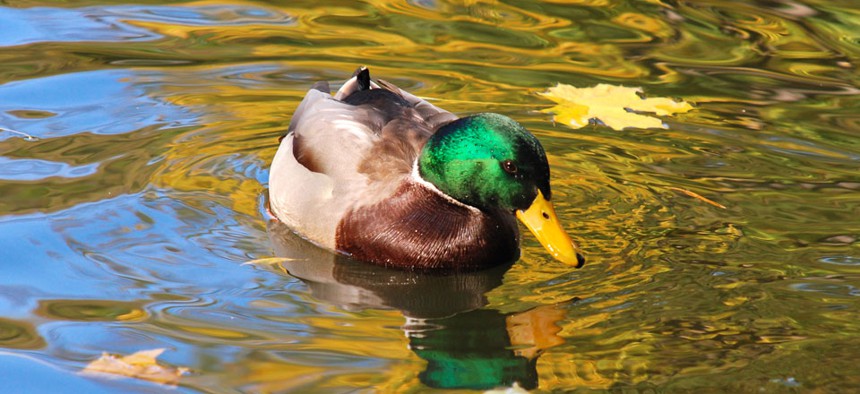
Raising fees for duck hunters is one of the ideas proposed. Svietlieisha Olena/Shutterstock.com
On Budget Conference Committee, Even Small Proposals Generate Arguments
Ideas as small as raising user fees are generating some controversy.
Both Republicans and Democrats on the budget conference committee agree that if the panel reaches an agreement at all, it is likely to be a small one. And so far, they're not kidding.
One of the few ideas to leak out of the committee involves user fees, the small costs that the federal government tacks onto activities ranging from commercial airplane flights to duck hunting.
The fees are often just a couple of dollars per transaction—the essence of small budgeting tools—yet even that is generating some argument.
As the committee continues to mull a deal that would fund the government for the rest of fiscal year 2014 and potentially fiscal year 2015 as well, Democrats insist that new revenues must be a part of any deal. While Rep. Paul Ryan of Wisconsin, the panel's Republican cochairman, insists he will not consider any deal that raises taxes, he has shown an openness to increasing user fees and finding non-tax revenues as a potential area for compromise.
But the proposals have drawn criticism almost from the start. Some say that raising user fees is just a tax increase by another name. Others say the fees won't be enough to make up for the kinds of deep spending cuts Republicans want.
Take for example, a proposed $5 fee for airline passengers that was included in both President Obama's budget proposal and the House Republicans' spending plan for FY2014.
Under current law, airline passengers already pay a $2.50 Transportation Security Administration fee every time they board a plane, up to a maximum of $5 per trip. The White House has proposed a $5 flat charge for each one-way trip, that would increase by 50 cents every year until 2019, when it would cap out at $7.50. The Office of Management and Budget estimates that such a change would bring in an additional $25.9 billion over 10 years, which would be split to cover costs for the TSA and potentially reduce the deficit by $18 billion.
That's where the plan earns criticism from tax-fairness groups. User fees are intended to take funds from the beneficiaries of a specific service and use the money to pay for that service. The money taken from airline customers and put into the general fund may not necessarily benefit the frequent fliers that paid for it. That's what Taxpayers for Common Sense Vice President Steve Ellis calls a "gimmick."
"When you start generating revenue from these and putting it somewhere else, it becomes a lot more like a tax," Ellis said.
Lobbyists for the aviation industry have pushed back hard on the proposal, arguing that even the reinvestment in TSA funding does not qualify the charge as a user fee. The fee benefits a federal program, they argue, while potentially costing them customers. "America's airports think that aviation is a national defense function and it should be funded as such," said George Kelemen, a spokesperson for Airports Council International, North America.
Other proposed user fees would impact much smaller groups of Americans. For example, one proposal would increase the cost of duck stamps by $10, to $25 from $15. Hunters are required to buy the stamps annually in order to hunt migratory waterfowl, and a majority of the funds are used as part of conservation efforts. The cost of the stamps has remained unchanged since 1991 and the White House estimates that a $10 increase would reduce the deficit by $14 million per year.
Though user fees in general are still on the table, Democrats argue that some of the charges—particularly the TSA fee—would unfairly burden middle-class Americans.
Democrats are instead pushing revenue proposals that target special interests and wealthy individuals, including the owners of the nation's more than 11,000 private jets. Democrats released a hit list of potential tax loopholes they would like to close earlier this month, which include ending special tax deductions for the owners of corporate jets, yachts, and vacation homes, as well as eliminating a loophole that allows businesses to deduct expenses for moving a plant overseas.
Though many Republicans on the conference committee—including Ryan himself—agree that there are several wasteful tax loopholes that should be closed, they argue that those conversations should be a part of a larger tax-reform overhaul.
Republicans, and even some Democrats, have voiced concerns that closing loopholes now would prevent tax writers from folding those savings into a broader reform plan to lower overall rates.
Democrats on the conference committee note that Congressional Budget Office Director Doug Elmendorf threw some cold water on that theory during the committee's last hearing, telling conferees that it would be possible to close some loopholes without endangering a larger tax overhaul.
The House Ways and Means Committee, which is currently putting together a tax-reform plan, disagrees. "We don't support higher taxes for more Washington spending, and while we appreciate CBO's opinion, it is only [the Joint Committee on Taxation] that scores and provides analysis on tax policy," a spokesperson for the committee said Friday.
A senior Democratic aide said that they still hope to get Republicans to agree to close a few tax loopholes. But barring that kind of an agreement, the path to a deal is narrower. User fees and other revenues, the aide said, "likely wouldn't be enough for Democrats to agree to any significant spending cuts impacting seniors and families."
"We're just a little perplexed that our Republican colleagues think it's a better idea to raise TSA fees on the American public than close a tax loophole that actually creates incentives for American companies to move their profits to places like the Cayman Islands," said Rep. Chris Van Hollen, a member of the conference committee.
(Image via Svietlieisha Olena/Shutterstock.com)







